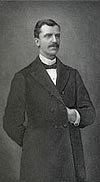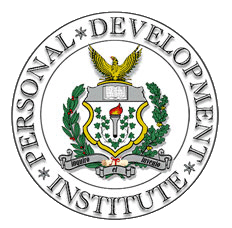By Prof. Joseph C. Carter
Author of The "Acres of Diamonds" Man
In 1862, during
the second year of the Civil War, Russell H. Conwell, then a student in
his first weeks at Yale College, answered his country's call and
enlisted in "Lincoln's Army." Although not yet 20, he was
commissioned a captain, serving until 1864. When he returned to civilian
life, he studied law in the office of his former colonel, then earned
his degree at Albany Law School and became a licensed lawyer.
But Conwell was also a writer. In 1869 he
revisited the Civil War battlefields and burial grounds, sending graphic
reports of the horrors of the War in the South to New England
newspapers. This work earned him a position on the staff of the Boston
Evening Traveller and ultimately a round-the-world journey as
correspondent for the American Traveller, a weekly journal published in
Boston.
As Conwell told it, he was riding in 1870 in a
camel caravan along the valley between the Tigris and Euphrates Rivers
in Mesopotamia when he heard a guide weave tales to entertain his
American tourists.
Conwell, then only 27, was deeply impressed by
a legend about a prosperous Persian farmer, Ali Hafed. Lured by the
stories of a Buddhist priest, Ali deserted his fruitful lands to search
for immense wealth in mythical diamond fields.
Far and wide Ali Hafed roamed, footsore and
weary. Youth and wealth disappeared, and he died far from home, an old
and disillusioned pauper. Not long afterward, the guide related, acres
of fabulous diamonds were found on Ali Hafed's own land.
To the other tourists, this was just another
alluring story, but in Conwell's mind a great truth had been sown. To
him it said: "Your diamonds are not in far-away mountains or in
distant seas; they are in your own back yard if you will but dig for
them."
During the ensuing years Conwell sowed the
seeds of service which produced for him his harvest of opportunities,
his many useful careers.
As a 36-year-old lawyer in Boston, Conwell was
consulted about disposing of a dilapidated church in nearby Lexington..
With optimistic sympathy, he advised the congregation that their church
need not be sold, but could and should be rebuilt.
How he was ordained and accepted his first
pastoral charge in that church . . . how a deacon from Philadelphia, who
came to hear him preach, invited him to become, in 1882, the pastor of
newly built Grace Baptist Church at Berks and Mervine Streets in that
city . . . how he served as pastor of the Grace Church congregation for
43 years (34 of those years in the magnificent Temple at Broad and Berks
Streets). . . how he lectured on the Lyceum and Chautauqua circuits . .
. how he was author of 40 books . . . how he wrote church hymns and
college songs . . . how he founded Samaritan (now Temple University)
Hospital . . . all these and many more were episodes illustrative of the
humanitarian spirit, remarkable vision, and organizing skills of Russell
Conwell.
One evening in 1884, at the Berks and Mervine
Streets church, a young man went to Conwell in his study and expressed a
desire to prepare for the Christian ministry. Conwell offered to teach
the youth one night a week, but on the agreed-upon evening seven earnest
young men appeared. Here were Conwell's "diamonds" here at
home, in his own community,in Philadelphia. Thus was the school called
"Temple" founded.
Conwell's class grew in numbers, and within a
short time the services of other teachers were enlisted and it was
necessary to rent a room,then a building, then two. Within a few years
the studious group had grown from seven to several hundred students, and
a charter for"The Temple College" was issued in 1888. Of
course, Conwell already had been elected its president, a position he
held for the next 38 years.
His famous lecture, "Acres of
Diamonds," soon made him America's foremost platform orator. By the
end of his life, in 1925, he had delivered the lecture more than 6,000
times in town after town throughout this vast land. It was heard by
millions from pulpits and public platforms, and by radio, and today
others are still reading his practical, optimistic essay and hearing it
on cassettes.
After Conwell had given "Acres of
Diamonds" for the 5,000th time he was awarded,at Philadelphia's
Academy of Music, a gold key symbolic of the gratitude shown by the
people of the Commonwealth of Pennsylvania.
Two public schools bear his name: one in
Conwell's native township, Worthington, Massachusetts, and the other in
Philadelphia.
The Administration Building of the School
District of Philadelphia, atop the east side of its tower, has a stone
bust of Conwell.
Conwell's name is carved on the frieze of the
Pennsylvania Department of Education headquarters in Harrisburg. And
Temple University has its Conwell Hall. In 1922 he was given the Kiwanis
Club award for "distinguished service."
Probably his greatest public honor came in
1923, when he was given the $10,000 Philadelphia Award (with scroll,
chest, and medal),bestowed each year on the area's outstanding citizen.
Today, Russell Herman Conwell lies at rest in
the Founder's Garden, surrounded by splendid buildings of the attractive
main campus of Temple University. Temple itself is an enduring monument
to the vision and genius of this soldier, preacher, writer, orator,
educator, and friend of mankind. Truly his own "Acres of
Diamonds."
Masters
of Success Collection
"Acres of Diamonds" by Russell H. Conwell -
In
these pages we learn the virtues of earning money through
honest, hard work. Alongside "As a Man Thinketh"
and "Think and
Grow Rich", one of the most well known books today.
"The Master Key System" by Charles F. Haanel -
The
Master Key System is the only 24 Lesson presentation of
the Creative Power of Thought. It teaches the ultimate
principles, causes, effects, and laws that underlie all
attainment and Success.
"Think and Grow Rich"
by Napoleon Hill - This is
one of the most famous books ever written; even today, many successful
businessmen attribute their success to this book!
"As a Man Thinketh"
by James Allen - A
set of philosophical musings on the power of our thoughts. One of the
best-known books of this kind.
"The Science of Getting Rich" by Wallace D. Wattles - Guides us toward financial success by
providing the tools to spiritual growth through the acquiring
of riches. Or, as I like to call it: "A Course in Manifestation."
"Self Mastery through Conscious Autosuggestion" by Emile
Coué - Arguably one of the most important people of the 20th
century, this man invented Autosuggestion (autogenic training) for use
in healing and improving oneself.
"How to Live on 24 Hours a Day"
by Arnold Bennett
- Not just another collection of timesaving
tips, this book is more of a challenge to leave behind mundane
everyday concerns, focus on pursuing one's true desires, and
live the fullest possible life.
"The Multiple Mentality Course" by Harry Kahne -
The original "multitasking" training system. Want or need to
do 2 or more things at once? Read this!
ALL
(8 eBooks) FOR JUST $15.95
(That's a $120.00 Value)
e
Readers
Rating:
5
out
of 5 stars







Download
"The Masters of Success Collection" Now

More Russell
Conwell Works
I have recently discovered the titles of several other
books by Russell Conwell and fortunately for all of us, they are still in
print. All of these may be purchased directly from, or ordered through
your normal book retailer.
|
Acres of Diamonds |
Acres of Diamonds
|



